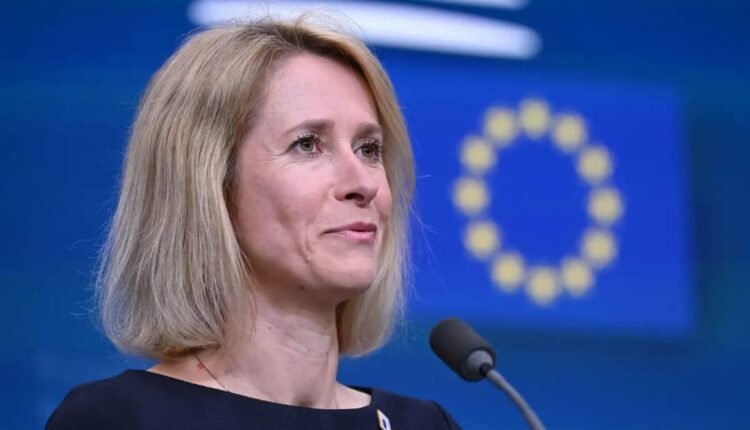EU Sanctions Dagalo, Condemns Rapid Support Forces Atrocities

Brussels – Sudanhorizon
The European Union (EU) has strongly condemned the “serious and ongoing atrocities” committed by the Rapid Support Forces (RSF) in Sudan, including those following their takeover of El Fasher, and approved sanctions against RSF Deputy Commander, Abdel Rahim Dagalo.
In a statement following a meeting of the Council of the European Union (CEU) on Thursday, High Representative for Foreign Affairs and Security Policy and Vice-President of the European Commission, Kaya Callas, said that the deliberate targeting of civilians, ethnically motivated killings, sexual and gender-based violence, the use of starvation as a method of warfare, and the obstruction of humanitarian access constitute serious violations of international humanitarian law and international human rights law, and may “constitute war crimes and crimes against humanity.”
In response to these crimes, the EU Foreign Affairs Council adopted “restrictive measures” against Abdel Rahim Hamdan Dagalo, the second-in-command of the RSF, according to the statement.
The European Union affirmed its readiness to impose further restrictive measures, as appropriate, on all parties responsible for destabilizing Sudan and obstructing its political transition.
The statement noted that ensuring accountability in Sudan is at the heart of the EU Foreign Affairs Council’s conclusions on Sudan as of 20 October 2025.
It added, “The EU will intensify its support for documenting and investigating these violations to break the ongoing cycle of impunity, which continues to generate new atrocities.”
The EU declared its support for the vital role played by accountability mechanisms, including the International Criminal Court (ICC) and the UN Independent International Fact-Finding Mission, and their investigations into crimes committed by the Rapid Support Forces (RSF), the Sudanese Armed Forces (SAF), and their partners.
It continued, “The culture of impunity in Sudan must end, and those responsible must be held accountable.”
It stressed that the primary responsibility for ending the conflict lies with the leadership of the Rapid Support Forces, the Sudanese Armed Forces, and their allied militias, as well as those who provide them with direct or indirect support. The European Union urged all external actors to take the necessary measures to end the sale or supply of arms and related materiel to all parties, in accordance with the UN Security Council arms embargo imposed by Resolutions 1556 and 1591.
It stated that it would continue to advocate for extending the jurisdiction of the International Criminal Court and the arms embargo to cover all of Sudan.
It also called on all parties to the conflict to resume negotiations to achieve an immediate and lasting ceasefire, in line with the Quartet statement of September 12.
On Protection of Civilians
Regarding the situation of civilians, the EU statement stressed that the protection of civilians and humanitarian access are not contingent on a ceasefire.
The EU called for concrete measures to protect civilians, including humanitarian and medical personnel, grassroots organizations, and local responders, and commended their courage.
It added, “All parties to the conflict must adhere to international humanitarian law.”
It also called for safe passage for civilians on the move and those wishing to leave El Fasher and other besieged towns, and for the immediate release of all hostages. The European Union stressed the need to ensure immediate, unconditional, safe, and unimpeded humanitarian access, in full compliance with international humanitarian law.
It rejected the imposition of any administrative fees or taxes on humanitarian actors and called for the expedited issuance and renewal of visas and travel permits.
It also called for an end to the arbitrary expulsion of humanitarian workers.
The EU demanded that the United Nations be allowed a permanent presence in Darfur and other areas outside the control of the Sudanese Armed Forces.
In the long term, the statement said that the grievances fueling conflict in Sudan, such as the marginalization of peripheral regions, can only be addressed through an inclusive, Sudanese-led, and Sudanese-owned political process.
The EU pledged to cooperate with all parties to the conflict and to intensify its support for dialogue among Sudanese civilian political groups, in close collaboration with the African Union, the Intergovernmental Authority on Development (IGAD), the Quartet members, and other partners.
The EU reaffirmed its commitment to supporting Sudan’s sovereignty, unity, and territorial integrity, and to ensuring the preservation of its governmental institutions. It also expressed its objection to the emergence of parallel governing structures, any action that would lead to the division of the country, and any external intervention that would exacerbate tensions and fuel the conflict.
Shortlink: https://sudanhorizon.com/?p=8914

